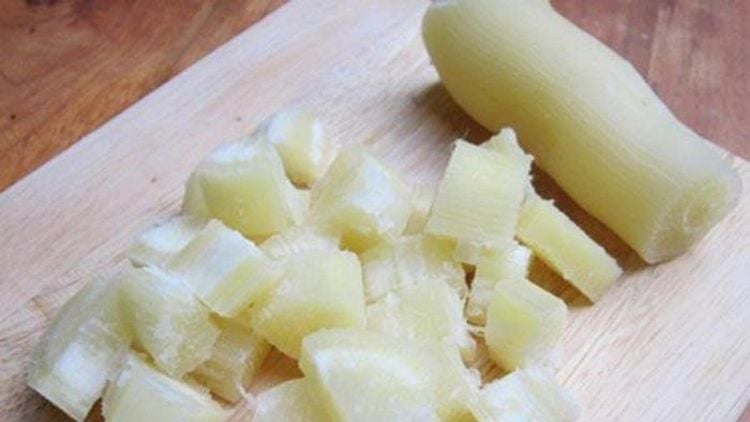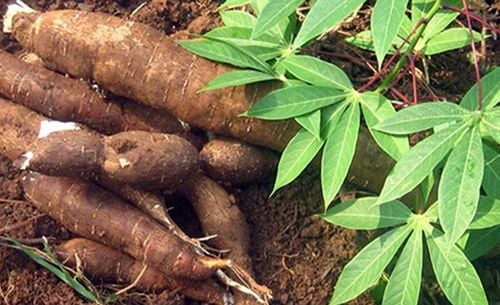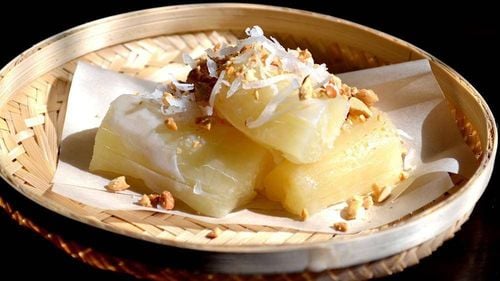This is an automatically translated article.
Cassava is a tuber that contains a number of important nutrients and resistant starch, which is beneficial for health. Therefore, many people wonder if eating cassava is fat? In fact, eating cassava properly is also a good weight loss support measure.
1. Nutritional composition of cassava tubers Cassava is a starchy root with a delicious taste. It is widely grown in tropical regions of the world because it has good drought tolerance. Cassava roots can be eaten directly (after baking, boiling) or ground into a cake flour. An important note is that cassava roots need to be cooked before eating. Eating raw cassava can cause cassava poisoning.
100g of boiled cassava root contains 112 calories. Cassava also provides plenty of carbs, fiber, vitamins and minerals. Specifically, 100g of cassava has 27g carb, 1g fiber, protein, fat, sugar, sodium, thiamine, phosphorus, calcium, riboflavin. Boiled cassava root also contains small amounts of iron, vitamin C and niacin.
2. Health benefits of cassava tubers Cassava brings many benefits to users. Specifically:
Reduce risk of metabolic syndrome: Metabolic syndrome is a combination of health signs such as high blood sugar, high cholesterol level, large waist circumference,... indicating a risk. high in diabetes and cardiovascular disease. Cassava is rich in flavonoids and fiber, which help protect the body against metabolic syndrome and its related complications; Promotes wound healing: Cassava is rich in vitamin C - an essential precursor of collagen - a structural component in skin tissues. Consuming enough vitamin C from food will promote the body's ability to self-heal; Preventing Malnutrition: Cassava serves as a measure against malnutrition in developing countries, especially Africa. Cassava is drought and pest tolerant, gives high yield, is a good food reserve when other crops are scarce. From there, it sustains food sources for developing countries; Lowers blood pressure: Cassava is high in potassium. Potassium lowers blood pressure, helps balance the amount of sodium in the body (the substance that raises blood pressure). 3. Does eating cassava lose weight? With an abundant nutritional composition, many people wonder if eating cassava is fat? In fact, cassava is a food containing up to 88-90% water, high in carbohydrates and many beneficial substances for health. Many women add to their weight loss menu because cassava is low in starch (accounting for 2%) and rich in fiber, suitable for effective weight loss and long-lasting satiety. Carbohydrates in cassava have the effect of balancing energy, eliminating excess fat and hindering the absorption of fat into the body.
Normally, in 100g of boiled cassava contains 112 calories. This is just enough calories to lose fat and reduce hunger. It also provides a good source of fiber and resistant starch, which promotes the growth of good bacteria in the gut. Fiber from cassava reduces appetite, promotes satiety. From there, users limit the intake of other foods into the body, supporting better weight loss.

Ăn sắn có giảm cân không là câu hỏi của nhiều người dùng hiện nay
4. Some other information regarding the use of cassava 4.1 Processing of cassava reduces its nutritional value Processing cassava by peeling, chopping and cooking significantly reduces the nutritional value of cassava. it. This is because many of the vitamins, minerals, fiber and resistant starch in cassava are destroyed during processing. Therefore, processed forms of cassava such as tapioca have significantly reduced nutritional value compared to fresh cassava.
Boiling cassava is a processing method proven to retain most of the nutrients in cassava roots. However, boiling cassava also loses a lot of vitamin C - a substance that is sensitive to temperature and easily dissolved in water.
4.2 Cassava should be consumed in moderation. 100g of cassava has 112 calories - quite high compared to other vegetables. For example, 100g of sweet potato provides only 76 calories, 100g of radish provides only 44 calories. Regular consumption of high-calorie foods can lead to weight gain and obesity. Therefore, it is necessary to consume cassava with reasonable portions. 1 serving is about 73 - 113g cassava.
4.3 Tapioca is high in resistant starch Cassava is high in resistant starch - a type of starch that is not modified in the digestive tract, with properties similar to soluble fiber. Consuming foods high in resistant starch has a number of health benefits.
Specifically, resistant starch helps promote the growth of beneficial bacteria in the gut, which helps reduce inflammation and promote gastrointestinal health. In addition, resistant starch also improves metabolism, reducing the risk of obesity and type 2 diabetes. Thus, cassava helps promote satiety, reduce appetite, and contribute to blood sugar control. However, users should be aware that there are many processing methods that can reduce the resistant starch content of cassava. Tapioca is generally less resistant starch than boiled/baked cassava roots.
4.4 Cassava contains antinutrients One of the biggest disadvantages of cassava is the content of antinutrients it contains. Antinutrients are plant compounds that can interfere with digestion and inhibit the absorption of vitamins and minerals in the body.
The important anti-nutrients in cassava include:
Saponin: An antioxidant that reduces the absorption of some vitamins and minerals; Phytate: This antinutrient can interfere with the absorption of calcium, magnesium, iron and zinc; Tannins: Reduces the digestibility of proteins, interferes with the absorption of iron, zinc, copper and thiamine. If cassava is consumed regularly and has an inadequate diet, the negative effects of antinutrients will be greater. If you only eat cassava occasionally, you do not need to worry about the effects of antinutrients. In fact, in some cases, antinutrients like tannins and saponins have health benefits.
4.5 Risk of Poisoning Cassava Cassava can be dangerous if eaten raw, eaten in large quantities or when improperly processed. This is because raw cassava contains chemicals that are cyanogenic glycosides, which can release cyanide in the body when we consume cassava.
When eating cassava regularly, it increases the risk of cyanide poisoning, which can impair thyroid and nerve function. It can cause paralysis and organ damage, and can even lead to death. People who are malnourished and eat less protein have a higher risk of these side effects (because protein helps remove cyanide from the body).

Ăn sắn với lượng lớn có thể khiến bạn gặp tình trạng ngộ độc
Besides, in some areas of the world, cassava has been shown to absorb harmful chemicals from the soil such as arsenic and cadmium. This may increase the risk of cancer in people who consider cassava as a staple food.
4.6 Risk of cassava allergy Like other allergies, symptoms of a cassava allergy include rash, swelling, vomiting and difficulty breathing. If you suspect an allergy to cassava, you should take the patient to the doctor immediately.
4.7 Guidelines for safe preparation and processing of cassava Cassava usually spoils quickly after harvest, so it is quite difficult to transport and store. According to research, removing cassava leaves 2 weeks before harvesting cassava roots helps to increase the shelf life of cassava roots by 2 weeks. Before preliminary processing, it is advisable to scrub the cassava roots with a brush and wash them under running water to remove dirt and bacteria. You should store cassava in dark, cool conditions and use within a few days.
You can eat cassava safely if it's prepared properly, occasionally in moderation. Guidelines for safe preparation and processing of cassava are as follows:
Peeling: The cassava peel contains most of the compounds that create cyanide, so it is necessary to peel it cleanly; Soak cassava: Should soak cassava in water about 48 - 60 hours before cooking and eating to reduce the amount of harmful chemicals in cassava; Cooking: Toxic chemicals are often present in raw cassava, so we need to cook cassava before eating by boiling or baking; Eat cassava with protein: Eating some protein-rich foods with cassava will be beneficial to health because protein helps to remove toxic cyanide in the body; Have a balanced diet: You can prevent the negative effects of cassava by building a varied diet menu that does not consider cassava as the sole source of nutrients. Cassava has a high water content, rich in fiber and resistant starch, so eating cassava in moderate amounts will not get fat, even help you feel full for a long time, reduce appetite, support weight loss very well. However, improperly eating cassava can be harmful to health, so you need to pay attention to preliminary processing and processing of cassava, eat with reasonable portions to protect your health.
Please dial HOTLINE for more information or register for an appointment HERE. Download MyVinmec app to make appointments faster and to manage your bookings easily.













